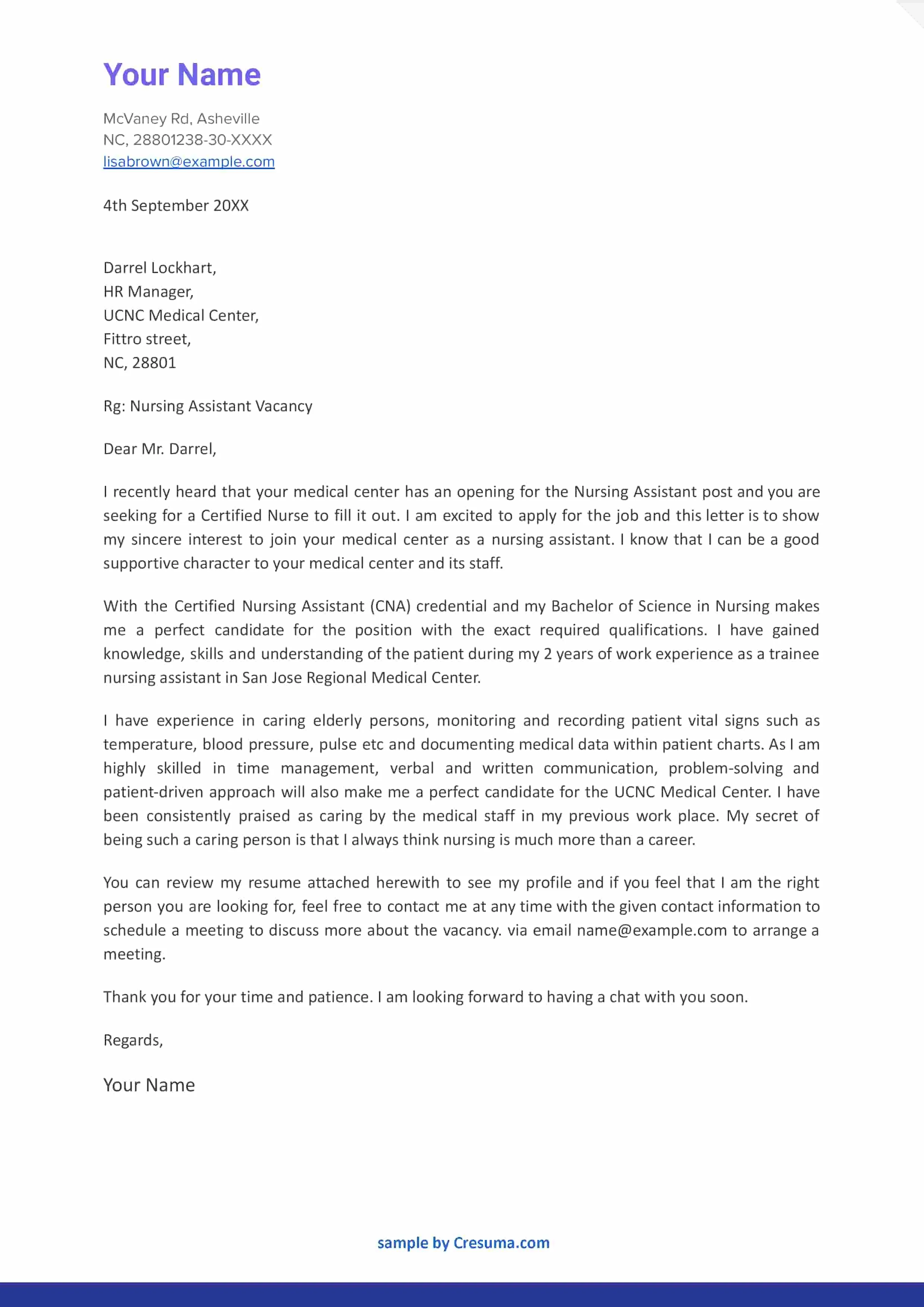Crafting a compelling cover letter is crucial for any nursing assistant seeking employment. Your cover letter serves as your first introduction to a potential employer, providing an opportunity to showcase your skills, experience, and personality. It’s your chance to make a strong first impression and convince the hiring manager to take a closer look at your resume. This guide provides essential tips and secrets to help you write a nursing assistant cover letter that stands out from the crowd, ultimately increasing your chances of landing an interview and securing your dream job. Mastering the art of the cover letter can be the key to unlocking new career opportunities and advancing in the healthcare field. A well-written cover letter is not just a formality it’s your personal marketing tool.
Highlighting Your Skills & Experience
Your cover letter should effectively highlight your skills and experience relevant to the nursing assistant role. Employers are looking for candidates who possess a combination of technical skills, soft skills, and practical experience. Be sure to focus on what you bring to the table and how your abilities align with the specific requirements of the job. Avoid generic statements and instead, provide concrete examples of how you’ve successfully utilized your skills in previous roles. This will enable the hiring manager to immediately understand your value as a potential employee. Emphasizing your key strengths creates a strong first impression, helping you stand out from other applicants. Focus on how you can benefit the healthcare facility.
Essential Skills for a Nursing Assistant
Nursing assistants must possess a range of essential skills to provide high-quality care. These skills go beyond simple technical abilities and encompass crucial interpersonal and personal qualities. Highlighting these skills in your cover letter is important, as they are often deciding factors in the hiring process. Focus on demonstrating that you have the right mix of skills to succeed in the demanding environment. Being able to show you understand the demands of the job and are prepared to meet them helps to ensure you’re the right fit for the role.
Communication Skills
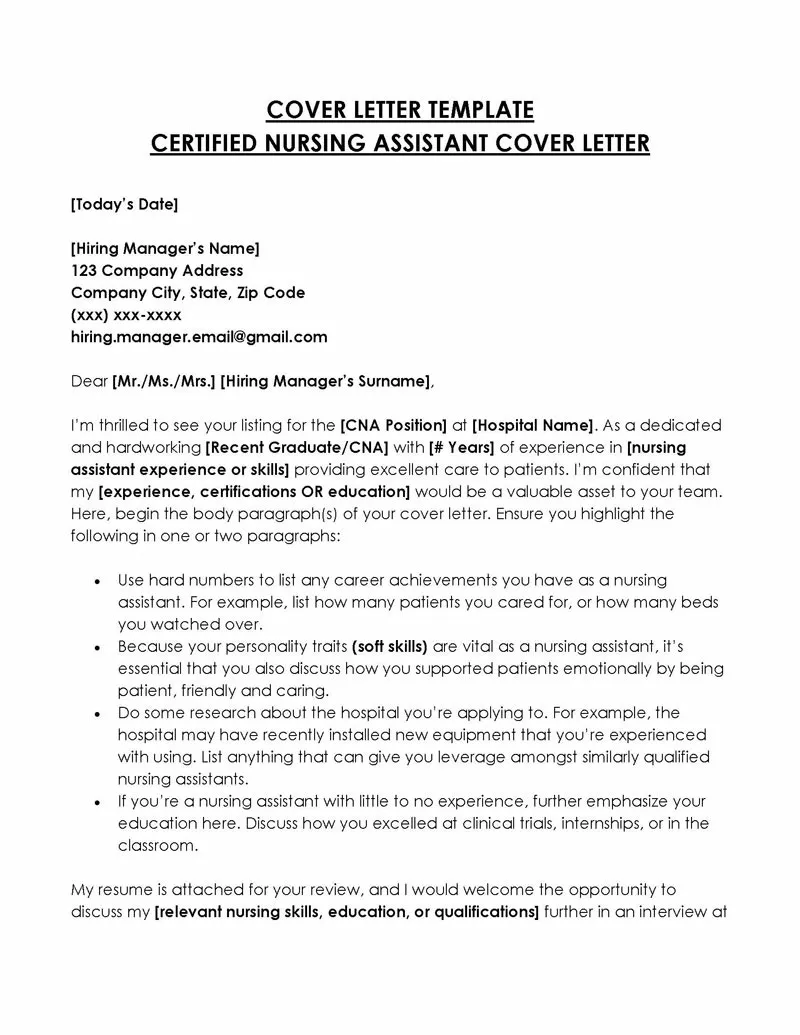
Effective communication is paramount for nursing assistants. You must be able to communicate clearly and respectfully with patients, their families, and other healthcare professionals. This includes active listening, providing concise and accurate information, and being able to explain complex medical information in an accessible manner. Your cover letter should demonstrate that you have strong verbal and written communication skills. Give examples of situations where you had to explain care to patients or coordinate with other medical professionals. Highlighting your communication skills makes you a more attractive candidate and shows that you can build strong relationships with patients and colleagues.
Empathy and Compassion
Nursing assistants work in a field that requires genuine empathy and compassion. Patients are often vulnerable and in need of emotional support. Your cover letter should reflect your ability to understand and share the feelings of others. Show that you are caring, patient, and sensitive to the needs of others. Give an example of a time you went above and beyond to provide emotional support or demonstrated empathy. Being able to showcase empathy shows you have a human-centered approach to patient care. It can significantly enhance your application, demonstrating your ability to connect with patients on a personal level and providing exceptional care.
Physical Stamina and Dexterity
The role of a nursing assistant is physically demanding. Your cover letter should acknowledge your physical capabilities and your ability to handle the physical aspects of the job. This includes moving patients, assisting with daily activities, and standing for extended periods. Highlight any relevant experience or training, such as physical therapy or experience in sports. This proves your ability to handle the physical demands and contributes to your suitability for the position. Demonstrating physical stamina and dexterity reassures employers that you are capable of the work and contributes to your overall profile as a qualified candidate.
Key Experiences to Showcase
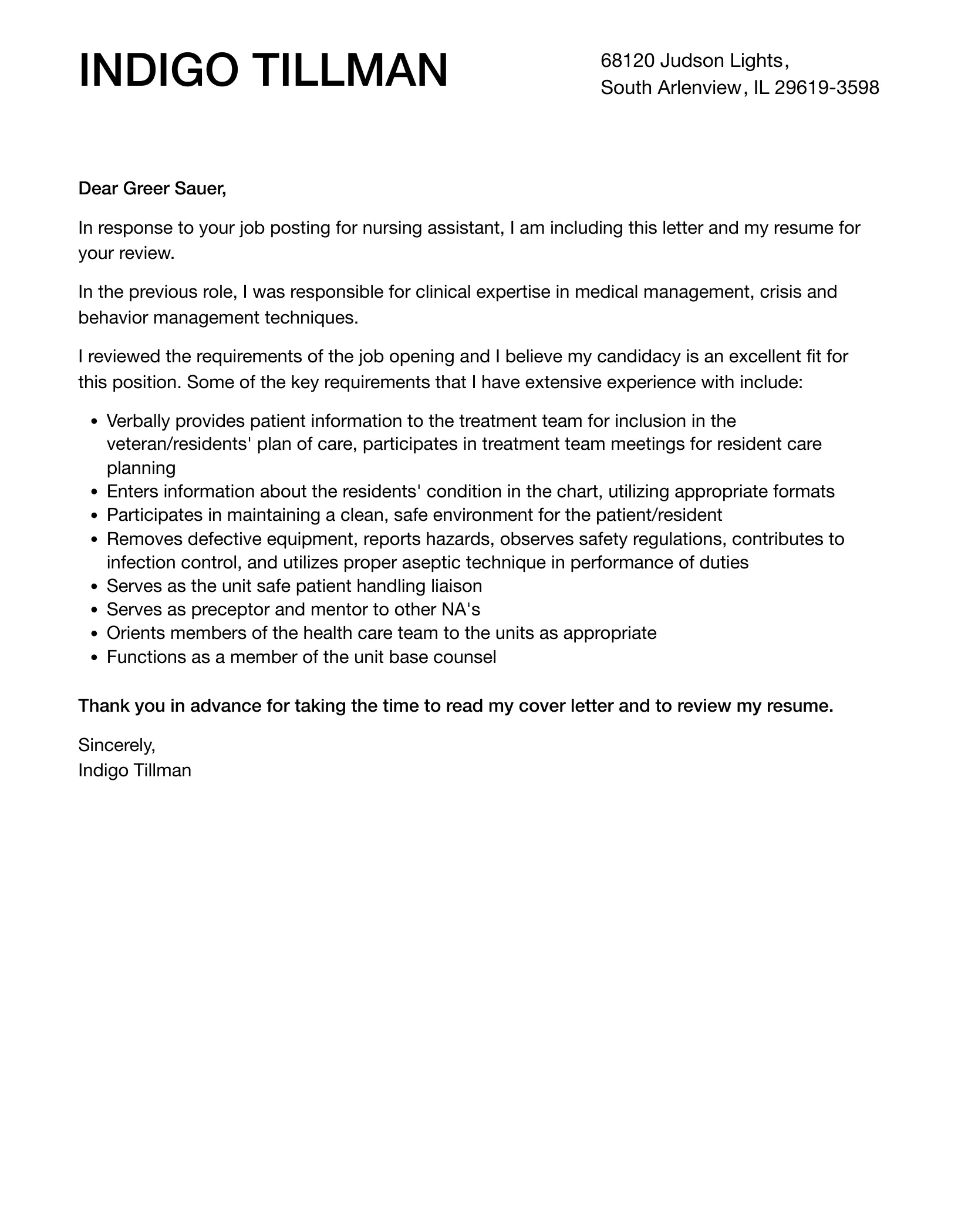
When writing your cover letter, make sure to focus on the experiences that best demonstrate your abilities and make you an ideal candidate. This section is an opportunity to sell yourself, demonstrating how your previous roles have prepared you for the specific job you are applying for. Focus on highlighting the specific skills and experiences that are most relevant to the position, tailoring your letter to meet the employer’s requirements. Showing that you understand the nature of the role and possess the needed skills is crucial.
Previous Healthcare Roles
If you’ve held previous roles in healthcare, be sure to highlight them. Even seemingly small healthcare jobs can showcase your willingness to work in a healthcare environment. For each position, mention your responsibilities and the skills you developed. Focus on the practical aspects of the job and the impact you made. The more you show you can handle the day to day, the more your resume will stand out. This demonstrates your familiarity with healthcare settings and your ability to thrive in them. Showing that you have prior healthcare experience is also a clear indicator to hiring managers.
Volunteer Experience
Volunteer experience in healthcare is a great way to demonstrate your commitment to the field, especially if you are new to the field. Include any volunteer positions and the tasks you performed. Even seemingly unrelated volunteer work, such as volunteering at a senior center, can demonstrate relevant skills. Highlight the skills you developed and how you applied them to help others. The willingness to volunteer also shows that you have a strong sense of empathy and dedication to helping those in need. Including volunteer experience is a strong way to prove that you care for others, making you a more attractive candidate.
Certifications and Training
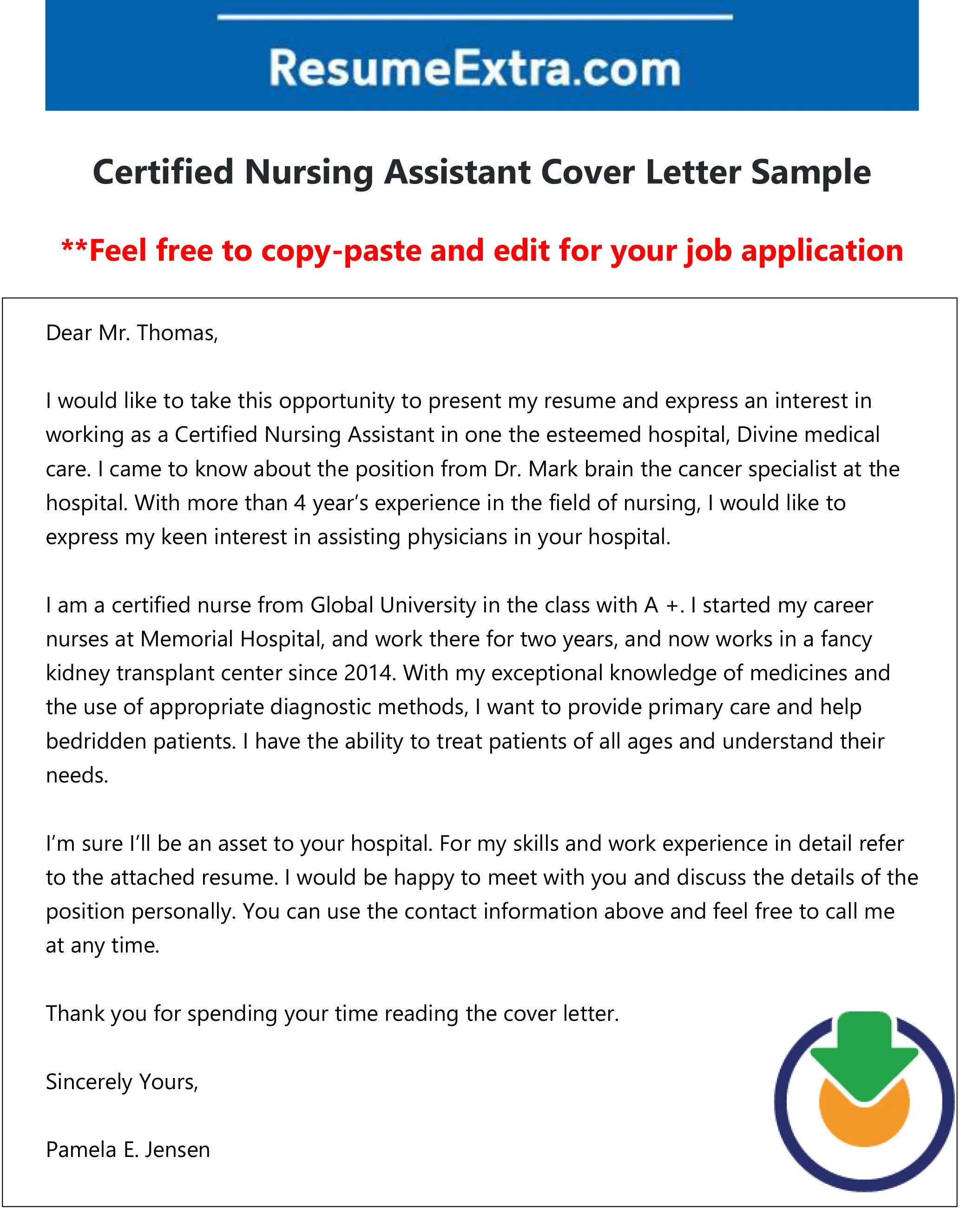
Certifications and training are essential for nursing assistants. Be sure to list all the relevant certifications and training you have obtained. This proves that you meet the minimum requirements for the job and are prepared to handle the specific tasks required. Highlighting your training and certifications shows that you are a prepared and skilled candidate. Including this information improves your overall value and helps you stand out in the applicant pool. This section is a direct way to demonstrate your qualifications to the employer.
Relevant Certifications to Mention
Certain certifications are vital for nursing assistants. Be sure to mention all relevant certifications. Include any certification related to patient care, first aid, and any specialized training you have received. Always provide certification numbers and the dates you obtained them. Providing all your certifications assures that you are in compliance with healthcare standards. This also shows your dedication to staying up to date with current safety and best practices.
CPR and First Aid Certification
CPR and First Aid certifications are crucial for nursing assistants. In your cover letter, explicitly state that you are certified in both. Include the dates of your certifications and the certifying organization. Keeping your certifications up-to-date indicates that you are committed to patient safety and prepared to handle emergencies. Highlighting these certifications shows the employer that you are trained to handle a medical crisis. This essential training will give the hiring manager confidence.
Certified Nursing Assistant (CNA) Certification
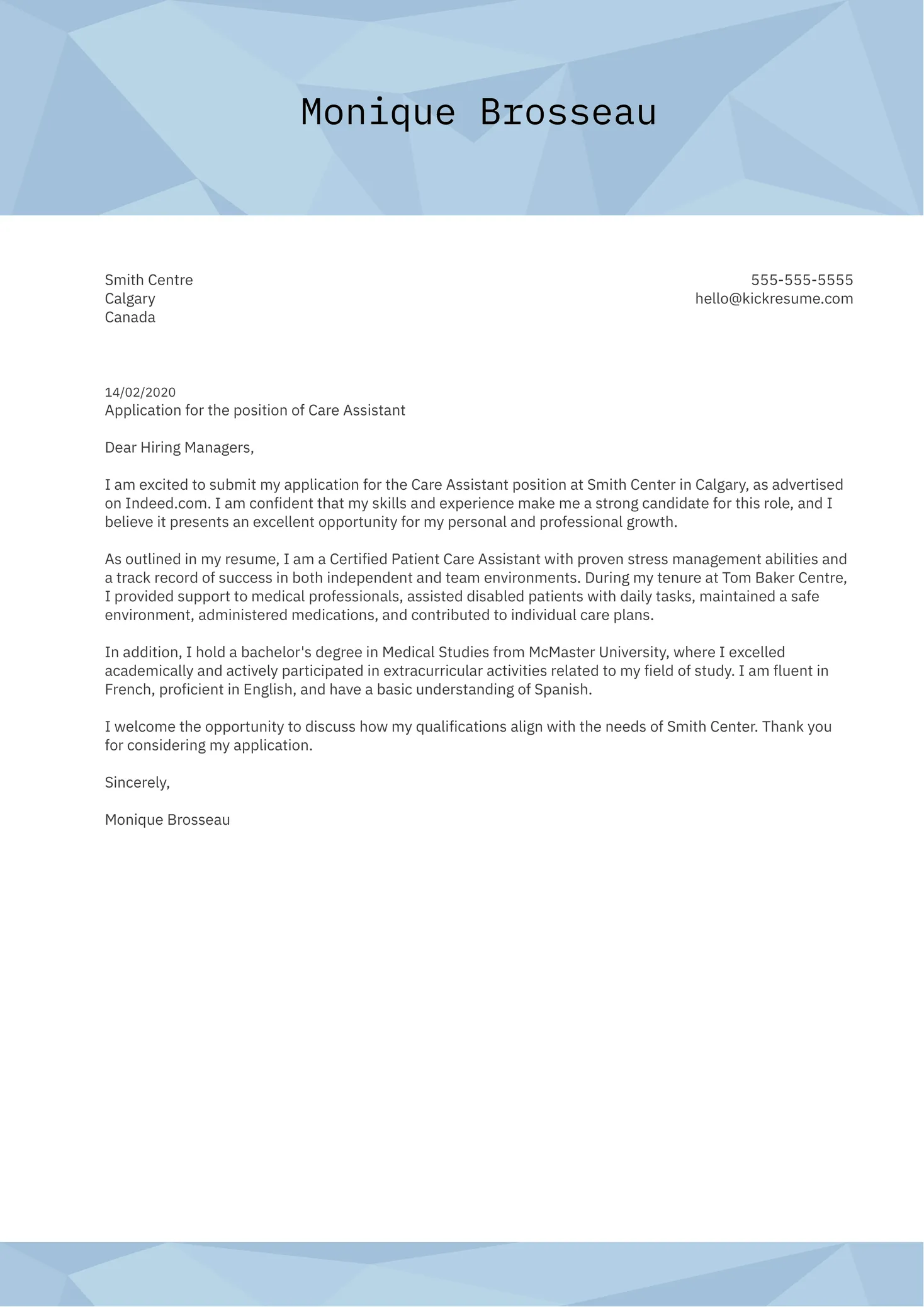
The CNA certification is the foundation of a nursing assistant’s qualifications. Be sure to prominently mention your CNA certification in your cover letter. Include the state in which you are certified and the certification number. If you are a recent graduate, include the date you obtained your certification. Mentioning your CNA certification lets the employer know you have met the core requirements and are authorized to work as a nursing assistant. This foundational certification is usually a requirement to be considered for an interview.
Other Specialized Training
Any specialized training you’ve received should be highlighted in your cover letter. This includes training in areas like dementia care, wound care, or medication administration. Provide details about the training programs you have completed and any certifications you have earned. Specialized training can make your application even more attractive, particularly if it aligns with the specific needs of the employer. It shows that you have gone beyond the basics and are prepared to handle specific challenges. Specialized training can show employers that you have a wider understanding of the job.
Formatting Your Cover Letter
Proper formatting is crucial for making a positive impression. A well-formatted cover letter is easy to read, professional in appearance, and showcases your attention to detail. The layout, font, and overall presentation will reflect your professionalism. Your cover letter should be carefully formatted to capture the hiring manager’s attention. Correct formatting helps to ensure that your skills and experiences are presented clearly. Make sure that the information is easy to access and that the employer can quickly find the information that they are looking for.
Contact Information
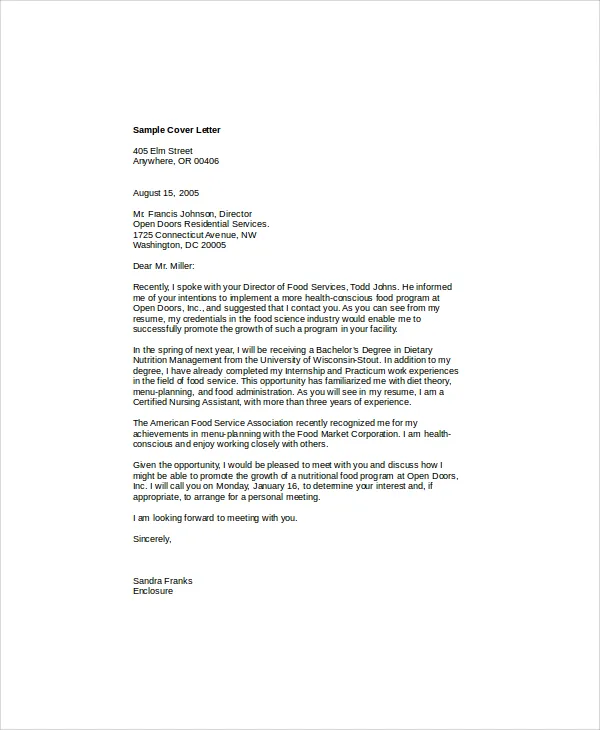
Include your full name, address, phone number, and email address at the top of your cover letter. Make sure the contact information is current and easy to read. Your email address should be professional. Double-check all contact details to ensure that they are correct. Your contact information allows the employer to contact you easily. Make sure your contact information is easy to find, so they can contact you quickly. Including this information is one of the basic requirements.
Professional Formatting
Use a clean, professional font like Arial or Times New Roman in a standard size. Use appropriate margins and spacing to make the document easy to read. Avoid using excessive colors, graphics, or unconventional formatting. Proofread your cover letter carefully for any grammatical errors or typos. Professional formatting shows that you pay attention to details and are committed to presenting yourself in a positive manner. Following professional formatting principles will help you create a cover letter that looks professional.
Tailoring Your Letter to the Job
Customizing your cover letter to the specific job you’re applying for is an important aspect of your job application strategy. Generic cover letters are often ineffective. Tailoring your letter to the specific job demonstrates that you have a genuine interest in the position and have carefully considered the employer’s needs. Customize your cover letter by highlighting the skills and experiences most relevant to the job description. Show the employer you understand their specific requirements. By tailoring the letter, you prove you’re a great fit for the role. Customizing your letter can significantly improve your chances of getting an interview.
Researching the Employer
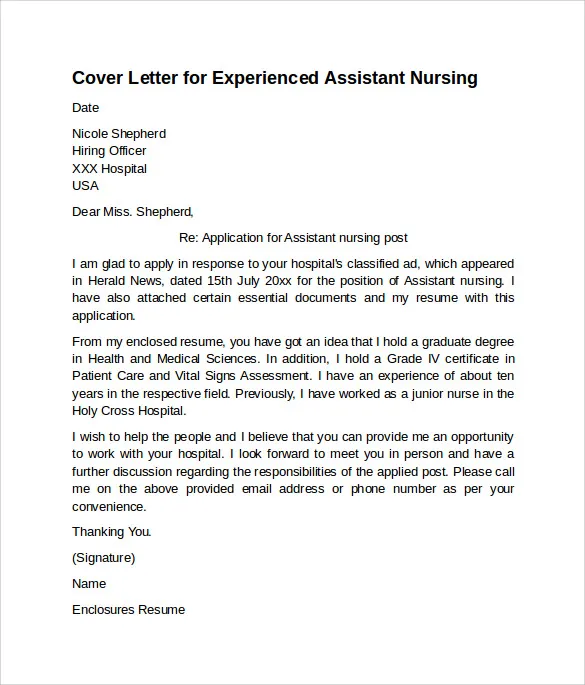
Before writing your cover letter, research the employer. This will help you understand their mission, values, and specific needs. Visit their website, read their job description carefully, and learn about their services. Tailor your cover letter to reflect your understanding of the employer’s mission and the job description. Demonstrating a genuine interest in the organization and its goals significantly increases your chances of getting hired. Understanding the employer will help you tailor your letter.
Matching Skills to Job Requirements
Carefully review the job description and identify the key skills and experiences the employer is seeking. Highlight your skills and experiences that align with the job requirements. Provide specific examples of how you have used these skills in previous roles. Demonstrating that your skills and experiences align with the job requirements makes a convincing argument that you are the right fit for the position. Aligning your skills to the job requirements makes a persuasive case for your suitability, increasing your chances of getting an interview. Aligning your skills is a way of proving that you know the requirements of the job.
Call to Action
Include a clear call to action at the end of your cover letter. This is the most important thing that you can do to encourage the employer to contact you. This provides an opportunity to express your eagerness to learn more about the position. Thank the hiring manager for their time and consideration. Encourage them to reach out to schedule an interview. A strong call to action can greatly increase your chances of getting the interview. Include this information at the end of your cover letter and you will see a marked increase in interest.
In conclusion, crafting a compelling nursing assistant cover letter is an essential step in securing your desired job. By highlighting your skills and experience, showcasing your certifications and training, formatting your letter professionally, and tailoring it to the specific job requirements, you can significantly increase your chances of making a positive impression and landing an interview. Remember to always proofread your cover letter carefully. Following these secrets and tips will provide you with the best opportunity to stand out and make an impact on the hiring manager. Good luck with your job search!
